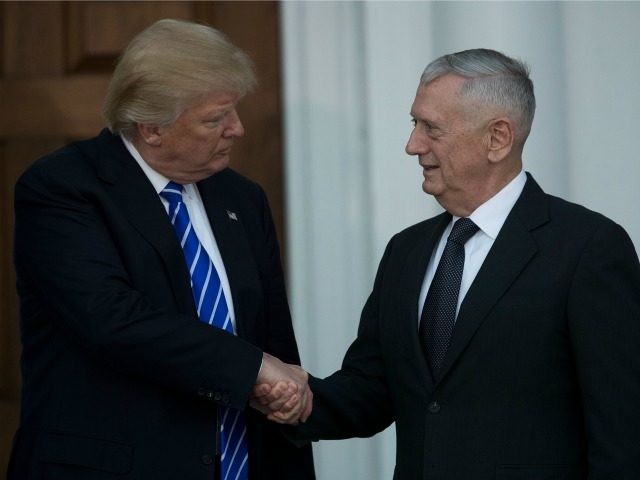On Friday, the Washington Post declared “the honeymoon seems to be ending between retired Gen. James N. Mattis and Donald Trump’s transition team amid an increasingly acrimonious dispute over who will get top jobs in the Defense Department — and who gets to make those decisions.”
The report cites two unnamed sources “close to the transition” who said a large number of Pentagon civilian posts remain unfilled, because the incoming Secretary of Defense is rejecting many of the candidates put forward by the transition team.
The spat between Mattis and the transition team is said to have begun when he learned about the nomination of Vincent Viola for Secretary of the Army by reading the newspapers. “Mattis was furious. It made him suspicious of the transition team, and things devolved from there,” said one of the Washington Post’s sources.
Since then, the sources indicated that two other major points of contention have been Mattis’ desire to “allow ‘NeverTrump’ Republicans to serve in the Pentagon,” and the transition team’s choices for a few key posts, such as the Undersecretaries of Defense for Intelligence and Policy.
The Post also sees a battle shaping up between Mattis and National Security Adviser-designate Mike Flynn, who is “busily filling up the National Security Council staff with military and intelligence officers he knows personally.”
There is allegedly tension between the two because Mattis used to outrank Flynn when the two generals were head of CENTCOM and DIA director, respectively, but now Flynn will have the higher position and be closer to President Trump. In fact, Mattis once removed Flynn from an intelligence position in Afghanistan, after a Central Command investigation of inappropriate intel-sharing with Pakistani officials. (Flynn came back from that career bump and ultimately became DIA director.)
Incoming White House Press Secretary Sean Spicer disputed the Washington Post’s report on Friday morning, dismissing all of the information provided by the Post’s sources as “completely false”:
Another surprising transition development was former CIA director James Woolsey’s abrupt resignation from the team, where he had been serving as a senior adviser on national security and intelligence.
There was much speculation that Woolsey left because he disagreed with Trump’s handling of the Russian hacking controversy, notably including a strong public disagreement about the reliability of WikiLeaks founder Julian Assange, who Woolsey dismissed as a “ne’er-do-well” who should be ignored, right after Trump spoke well of him.
NBC News reported on Thursday that a source close to Woolsey said “the former CIA chief felt increasingly uncomfortable with the Trump transition’s decision-making on matters of intelligence, particularly amid a report the incoming administration is considering restructuring certain intelligence agencies.”
However, as with the Washington Post’s anonymously-sourced story about friction between Mattis and the transition team, a transition spokesman dismissed the information from NBC’s source as “100 percent false,” and Woolsey himself stated his decision to leave had nothing to do with the hacking story or intelligence restructuring. Another NBC News source close to Woolsey said he was primarily interested in dispelling the notion that he was a close adviser to Trump, evidently feeling his role in the transition process had been overstated.
One other interesting bit of transition news: on Thursday, the Wall Street Journal reported that Mattis has resigned from the board of Theranos, Inc., the scandal-plagued blood-testing company currently suffering a spectacular corporate implosion, after having once been seen as a rising biotechnology star.
Mattis reportedly made his decision to step down from the Theranos board last month. A transition spokeswoman told the WSJ that he will “resign his positions with all outside entities, as is standard practice” if he’s confirmed as Secretary of Defense.

COMMENTS
Please let us know if you're having issues with commenting.